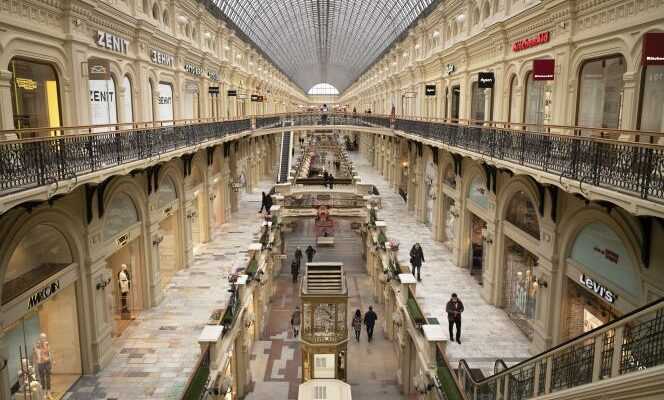The territory of Yulia T., in the Mozaika shopping center in southeastern Moscow, is modest: a small stand that sells accessories for smartphones. Tuesday, March 8, the customers are not rushing and the young woman, owner of the shop, is worried. The effect of the sanctions and that of the collapse of the ruble are combined: Western-made products, in particular of the Apple brand, are already more difficult to find; those from China have seen their prices soar by at least 30%. “Prices will continue to rise and people will have less and less money,” she predicted.
A few days earlier, on March 3, when a huge crowd gathered in the mall, the young woman took refuge behind her counter. “The queue stretched over two floors of the mall, in a climate of tension such that the police had to intervene”, she remembers. The object of this agitation: the possibility of making a last purchase at Ikea, shortly after the announcement by the sign of a closure of its stores.
That day, the young 27-year-old Muscovite did not dare to mingle with the crowd, even though she would have liked to buy, one last time, pillows and duvets from the Swedish store, “cheaper and better quality than anything else you can find”. But Yulia is afraid: of the economic crisis, but also of this military intervention which does not say its name. Several of his friends have left Russia, fearing a general mobilization that the authorities strongly deny they intend to impose.
“We will adapt”
Yulia’s worries (her first name has been changed), the feverishness of customers outside the doors of Ikea and the queues in front of banks are all signs of the fears of many Russians in the face of the coming crisis. And yet, a few days later, if the doors of the Ikea and those of the neighboring H&M are firmly closed, “for technical reasons”, as a sign modestly puts it, Muscovites who go shopping on this March 8 public holiday display an unfailing tranquility.
“We will do without Ikeas and Pradas, sweeps away Alexandre, 50, with a smile. In April, the war will be over, and if the brands don’t come back, too bad for them! » This entrepreneur has just bought skates for his 8-year-old daughter (“200 rubles more expensive than before, a straw…”) and a tulip for his young companion – grown in the Netherlands, but, there too, who cares: “We are already starting to grow flowers in the Moscow region…” Maria, 30, her flirtatious friend, adds: “For two years, we have been going on vacation to Crimea, and no longer to Europe. One can dress well among the Turks and the Chinese…”
You have 55.09% of this article left to read. The following is for subscribers only.
